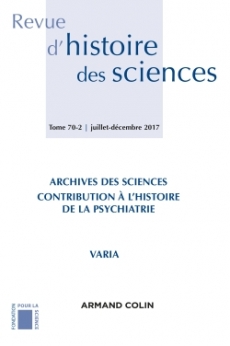
Revue d'histoire des sciences (2/2017)
Pour acheter ce numéro, contactez-nous
Recevez les numéros de l'année en cours et accédez à l'intégralité des articles en ligne.
L’article explore l’histoire des archives du Max-Planck-Institut für Psychiatrie (Institut allemand de recherche psychiatrique), à partir de leur constitution durant la première guerre mondiale et en examinant brièvement leur développement au cours du XXe siècle. Sur la base de cette contextualisation historique et institutionnelle, l’article engage alors une discussion portant sur l’acquisition par les archives des documents et écrits de Emil Kraepelin, fondateur et pre-mier directeur de l’Institut, dans les années 1900, et sur le travail de préservation et de catalogage qui s’ensuivit. Les auteurs examinent quelques-unes des pratiques et des stratégies mises en oeuvre pour l’archivage de ces écrits et l’obtention d’aides à la recherche, ainsi que pour la formation d’un groupe de travail en charge de l’évaluation des documents d’archives. Ensuite, l’article se concentre sur la planification et la mise en place ayant conduit à la publication de nombre de ces documents d’archives dans la Kraepelin Edition, en abordant les problèmes relatifs à la sélection des documents, ainsi qu’au financement du projet, à ses enjeux historiographiques et à ses orientations thématiques. L’article propose ainsi une réflexion sur plusieurs défis épistémologiques auxquels ce projet nous confronte, en soulignant notamment la tension entre les enjeux historiographiques du projet et le matériel archivistique d’origine.
The article explores the history of the archive of the Max Planck Institute of Psychiatry, beginning with its establishment during World War One and briefly tracing its development through the 20th century. Against this historical and institutional backdrop, the article then turns to a discussion of the archive’s acquisition of the papers of Emil Kraepelin, the institute’s founding director, in the 1990s and the ensuing efforts to preserve and catalog them. It examines some of the practices and strategies used in archiving the papers and generating their finding aids, as well as the formation of a working group to evaluate the papers. The article will then delve into the planning and execution that led to the publication of many of these archival records in the Kraepelin Edition, addressing issues related to document selection as well as the project’s funding, historiographic aims, and thematic focus. The article reflects on several of the epistemological challenges facing the project, stressing in particular the tension between the project’s historiographic aims and the archival source material.